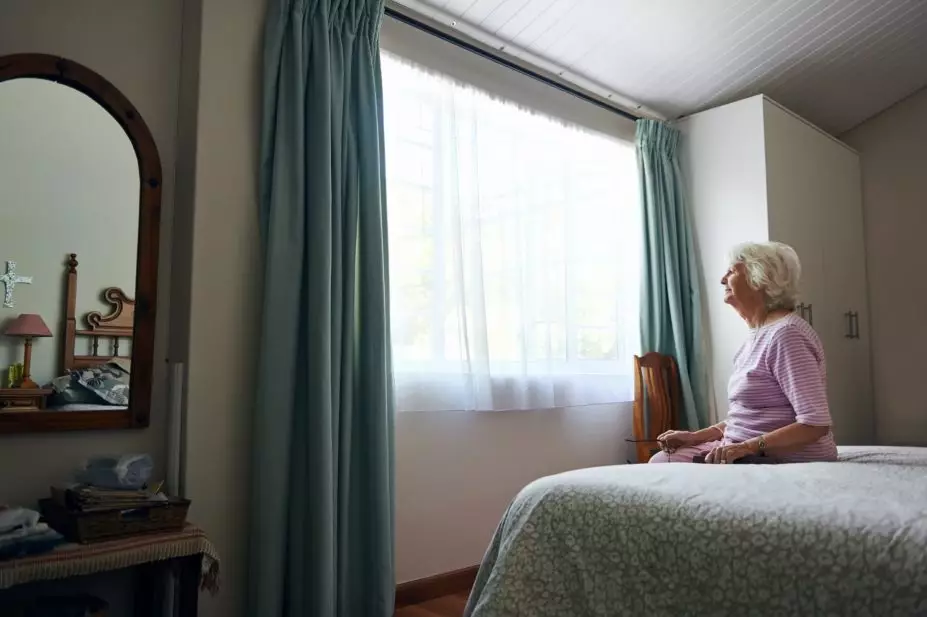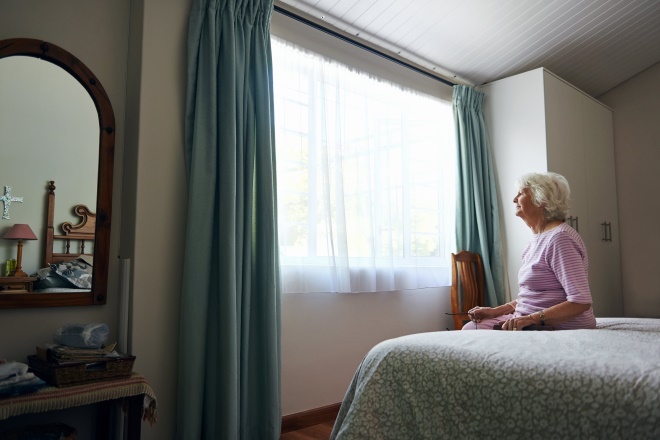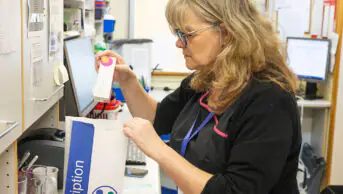
Shutterstock.com
Open access article
The Royal Pharmaceutical Society has made this article free to access in order to help healthcare professionals stay informed about an issue of national importance.
To learn more about coronavirus, please visit: https://www.rpharms.com/resources/pharmacy-guides/wuhan-novel-coronavirus

Source: Shutterstock.com
Community pharmacies are well-placed to maintain connections with isolated older people during the COVID-19 pandemic
Loneliness and isolation are part of life for many older people. According to Age UK — a charity that supports older people — there are 1.4 million chronically lonely older people living in England, with many more across the rest of the UK.
However, the current COVID-19 pandemic means that older people are even more likely to be experiencing loneliness.
Those over the age of 70 years have been advised to pay particular attention to the strict social distancing guidelines enforced in the UK on 23 March 2020. These restrictions mean that networks to ease loneliness, such as social groups or family visits, are out of bounds. Even before the lockdown officially began, some older people had chosen to isolate for fear of contracting the virus and the same is likely to be true now that some lockdown measures have begun to ease.
Many older people will also be among the 2.5 million in the UK with certain medical conditions, such as specific cancers and severe respiratory illnesses, who are deemed extremely clinically vulnerable. This group has been advised to “shield” from the virus by staying at home at all times and avoiding any face-to-face contact until at least the end of June 2020.
Age UK is receiving calls from the children of older parents and other relatives, expressing concerns about their loved one’s isolation. The virus has been a “sharp shock” to people, says Lesley Carter, clinical lead (professionals and practice) at the charity. Older people are finding it difficult because they are no longer able to meet up with others — the social networks they have built up over the years have collapsed, she says, adding that the pressures of isolation mean that “a lot of people will have lost weight and are drinking more alcohol than before”.
Mental health
As we age our values change and, towards the end of life, we prioritise relationships more and more
Isolation can also have a damaging effect on older people’s mental health.
“With an older person, connection is everything. As we age our values change and, towards the end of life, we prioritise relationships more and more,” explains Linda Blair, a clinical psychologist based in south west England.
“But if an older person is disconnected from other people and can’t reach out to anyone else, they can feel very despairing,” she says.
This isolation also means that if a family member or friend is terminally ill, people are “not able to say goodbye to their loved ones and cannot be at their bedside”, says Lila Thakerar, superintendent pharmacist at Shaftesbury Pharmacy in Harrow, north west London.
COVID-19 means that everyone “needs to be mindful about those who are struggling,” says Carter. “This is where pharmacists come into their own to give advice and signpost people to support,” she adds.
Pharmacists tend to know their communities extremely well and have a longstanding record of supporting older people. Jonathan Burton, chair of the Royal Pharmaceutical Society Scottish Pharmacy Board and a community pharmacist at Right Medicine Pharmacy at the University of Stirling, says pharmacy “is embedded in communities and part of the social fabric of people’s lives”.
Burton believes that not being able to interact face to face, either at all or as much, will have a “negative impact on communities”.
For individuals who are isolated, pharmacy can often be a part of their social routine, with those working in pharmacy — from dispensers to counter assistants — knowing individuals on a first-name basis
“For individuals who are isolated, pharmacy can often be a part of their social routine, with those working in pharmacy — from dispensers to counter assistants — knowing individuals on a first-name basis,” he says.
Even before the lockdown, Ade Williams, superintendent pharmacist at Bedminster Pharmacy in Bristol, says he was helping to address isolation in his community, which has a large older population — some 65% of its patient demographic.
“As a pharmacy, we realise the importance of providing simple, yet significant, interventions to make a difference to our unique community.
“We work proactively with a number of local agencies to identify people at risk of experiencing loneliness to be part of a befriending service. We offer a free delivery service for patients deemed to be vulnerable, and work with those with multiple health conditions, spending time to understand what’s going on with them,” Williams explains.
Stepping up
We wanted to educate our elderly population about what the pandemic means, answering questions, such as ‘why do I need to stay at home?’ and ‘what does social distancing mean?’
Since the lockdown began, Williams has stepped up activities for his older and vulnerable customers. “We wanted to educate our [older] population about what the pandemic means, answering questions, such as ‘why do I need to stay at home?’ and ‘what does social distancing mean?’” he says. Williams has produced information leaflets on COVID-19 and written articles for his local paper answering common questions about the virus. He has also been working with local organisations to provide support for older patients, including a partnership with a women’s running group.
The ‘This Mum Runs’ group was established in 2015; however, following the enforcement of social distancing, its members could no longer run as a group. Now, these women are easing the strain on Bedminster Pharmacy’s delivery service by delivering medicines to older residents in Bristol who are self-isolating. Williams describes the initiative as “the perfect fit”.
“These women were already doing community jogging, and their delivery service provides reassurance to older people requiring medication”.
The number of home deliveries provided by pharmacies in England more than doubled between February 2020 and March 2020, according to a survey of 1,410 pharmacies conducted by the National Pharmacy Association (NPA), with some reporting a 300% increase. In an effort to ease this demand, the government announced in March 2020 that pharmacies in England would be able to use NHS volunteers to meet the increased need for home deliveries. However, some pharmacies have expressed concerns about using these volunteers, owing to the responsibility placed on them to carry out background safety checks.
In April 2020, NHS England announced an essential pandemic delivery service, meaning that pharmacies must help patients who are shielding to receive their prescriptions, either through family or friends, the NHS volunteer service or by delivering medicines as part of a pharmacy-run advanced delivery service. Similar services have also been implemented in Scotland and Wales.
In April 2020, Boots increased the number of staff delivering prescriptions to vulnerable people across the UK, hiring more than 500 new drivers, as well as introducing a prescription delivery service in an additional 40 stores across the UK.
I’ve been [at Shaftesbury Pharmacy for] 27 years and know a lot about our patients, their personal circumstances and how vulnerable they are
Thakerar’s pharmacy is going beyond delivering just medicines for its older and vulnerable customers. “I’ve been [at Shaftesbury Pharmacy for 27 years] and know a lot about our patients, their personal circumstances and how vulnerable they are. So, as well as picking up the phone to see if my patients are OK, I ask if they need anything else, such as toilet rolls, shower gel, and toothpaste,” she says.
Reena Barai from SG Barai Pharmacy in Sutton, south London, says that, since the outbreak began, her pharmacy has enabled older people in isolation to purchase items, such as vitamins and incontinence products, by credit card over the phone. These can then be delivered alongside their medicines.
Delivery drivers can provide a much-needed social connection for some isolated patients. Those delivering medicines to people should stay long enough at the door to let the older person open it, and smile and have a chat, suggests Blair.
“That will mean everything when you spend those extra minutes with them,” she says, adding that if a person does not come to their door to respond to a delivery and if there is not the chance for personal contact, then leaving a handwritten message on the package can make a big difference and only takes a moment. “The kindness of that message could last that person for days,” she says.
However, delivery drivers will have had to change their behaviours from “shaking hands to leaving things on doorsteps,” Burton says. “They can still give a cheery wave, and the connections and relationships built with pharmacy will still be there.”
Time to talk
Those connections can also be maintained by spending time talking to patients over the phone. To help vulnerable older people during the pandemic, Carter suggests pharmacists should keep in contact with those who regularly get prescriptions to make sure they are still taking their medicines and are not experiencing any side effects.
Pharmacists could help by taking as many phone calls as possible, rather than using an automated prescription service, suggests Blair.
Williams has created a list of patient records linked to age and staff use this to call older patients every two weeks to ask how they are doing and to check on their prescriptions. This approach is safeguarding people’s health. “Just recently, one patient was five days behind on their insulin prescription, so I called the doctor who immediately issued a prescription,” he says.
The NPA survey showed that the number of phone calls to pharmacies has tripled during the pandemic. Barai says her pharmacy is receiving many more phone calls from older people since the outbreak began, and her staff are spending time talking to them to allay their fears. This means that signposting to other services is also important. Carter says pharmacy is recognised as “a safe option” for many older people requiring health advice and for signposting to further information.
Barai is the primary care lead for Cheam and South Sutton Primary Care Network, which has set up a community response team that includes pharmacists, GPs and members of the voluntary sector, who identify isolated and vulnerable people in need of help. “The team shares how these people can get access to, say, medicines, food parcels or personal care. We all work together to support vulnerable people,” she says.
Going unrecognised
We have a role now that should be better appreciated than before, as part of a system that links health and social care
Spending extra time on the phone to patients, offering delivery services and signposting to information are crucial to supporting isolated older people, especially during the COVID-19 pandemic. However, pharmacies are largely unpaid for these activities.
The new pandemic delivery service, for example, is dedicated to shielded patients, and pays just £5 plus VAT per delivery. Thakerar points out that the reality for pharmacy is that “there is no limit on mileage and no guidance on locality”.
Some deliveries may be nearby, while others can be miles away. “I average my costs to be about £10 per delivery, including the cost of the driver, the vehicle, fuel and insurance,” Thakerar says.
The extra demand for deliveries to isolated older people has also meant she has needed to recruit an additional delivery driver at a cost of £250 per week.
Thakerar believes pharmacy representatives should negotiate with the government to reimburse delivery charges, “not just for shielding patients, but for all patients aged over 70 years”.
Williams agrees – despite his collaboration with the ladies running group, his pharmacy is making “a loss on deliveries, close to £500 per month”. “There has been a massive surge in demand for deliveries for older people,” he says.
He would like pharmacy to have an agreement with the government “that encompasses the vital role we play”.
“We have a role now that should be better appreciated than before, as part of a system that links health and social care. And if we were better funded, we could provide sustainable solutions to some of the challenges we face across these sectors.”
Williams urges the Pharmaceutical Services Negotiating Committee in England to “fulfil its role in negotiating with the government to value our role”.
Despite the huge pressure to deliver support for older people and the lack of financial recognition, the feedback from most patients “is fantastic,” says Thakerar.
“We’re constantly being thanked. And that gratitude makes it all worthwhile.”


